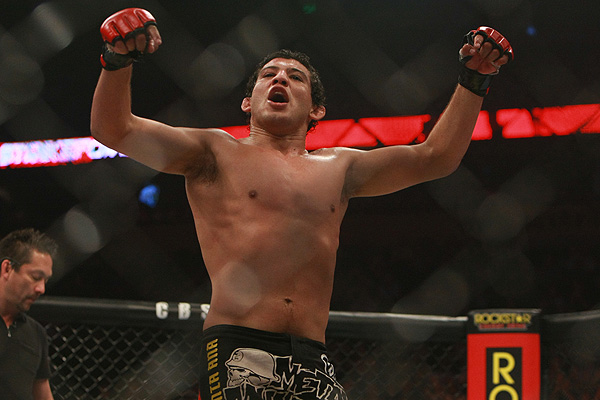MMA Paper Trail: Cold Reality
News & Notes

An
injury to champion Gilbert Melendez nixed Strikeforce’s Sept. 29
event. | Photo: Sherdog.com
News & Notes
After last month’s cancellation of UFC 151 sent shockwaves through the MMA world, the cancellation of a Strikeforce event planned for Sept. 29 was met with resignation.
Seven days out from the show, it was announced that headliner Gilbert Melendez had suffered a shoulder injury and had to pull out of a lightweight title defense against Pat Healy. Showtime, which pays to broadcast Strikeforce events, opted out of the event citing Melendez’s absence and lack of a “marquee undercard.” The network passed when Melendez rival Josh Thomson offered to step in for Healy.
Advertisement
The next scheduled Strikeforce event on Nov. 3 also took a hit, as an injury to former UFC champion Frank Mir forced him out of the featured bout with Daniel Cormier. Cormier’s replacement had not been decided as of month’s end, but he is still scheduled to compete.
Despite the stressful twists and turns, there was no indication
relations were strained between Showtime and Strikeforce, which the
UFC’s parent company purchased in 2011. The contract between the
parties expires this year, with options to extend.
The Strikeforce cancellation was not amplified as the UFC 151 reaction, with impassioned rhetoric about who was to blame. UFC light heavyweight champion Jon Jones endured backlash after declining to fight UFC 151 replacement opponent Chael Sonnen in the main event after Dan Henderson was injured.
Of course, there was not nearly as much money on the line for the Strikeforce event. A UFC source estimated to veteran MMA journalist Dave Meltzer that the organization took a $20 million hit as a result of the pay-per-view event’s cancellation. The losses were somewhat mitigated by Jones boosting business for UFC 152 with his title defense against Vitor Belfort later in the month.
Other items of interest:
• The World Series of Fighting announced its Nov. 3 premiere event at a press conference in Las Vegas. The organization has a deal to broadcast the card, expected to be headlined by former WEC champion Miguel Torres, on the NBC Sports cable channel, formerly Versus. A network source told MMAFighting.com that the broadcast deal covers only the first World Series of Fighting event, with an evaluation of whether to commit to further shows afterward. The promotion unveiled Sig Rogich, a former athletic commissioner in Nevada and prominent political and public relations executive, as its CEO. The promoter is veteran kickboxer Ray Sefo, and the matchmaker is MMA agent Ali Abdel-Azis. The organization announced a partnership with Caesars Entertainment and plans to hold eight to 10 fight cards per year at Caesars-owned Planet Hollywood in Las Vegas. It was scheduled to hold open fighter tryouts on Oct. 1;
• After its latest event in the United Kingdom, the UFC announced a new figure at the helm of its U.K. operations. Garry Cook, a former Nike executive and chief executive of the Manchester City Football Club, was introduced as the UFC’s new vice president for European, Middle Eastern and African markets. Cook takes over for Marshall Zelaznik, an American television executive who helped the UFC establish its foothold in the United Kingdom and negotiated television deals there. Zelaznik is expected to return to work in America as the UFC’s managing director of international development. Cook is known in the U.K. as a controversial executive who has made his share of public gaffes, including an endorsement of the soccer club’s Thai owner who was found guilty of corruption in his native country. Cook resigned from the team a year ago after reports surfaced that he had sent an offensive email to the mother of a soccer player who was battling cancer. Prior to the soccer job, Cook was a longtime executive at Nike. He was introduced at a press conference following the UFC’s Sept. 29 event in Nottingham, England. White praised Cook’s track record of taking brands global. The UFC made its first international push into the U.K. in 2007 with an expensive and extensive branding campaign that company executives later said was overly aggressive;
• The MMA world got a flavor of contractual politics when Bellator Fighting Championships exercised a clause to match any offers received by a fighter it had signed, did not book a fight for and released. The management of Tyson Nam, a 28-year-old bantamweight who upset Bellator champion Eduardo Dantas on a card in Brazil, publicly protested Bellator’s exercising of a clause that allows it to review and match any contract offer he receives from another promotion. While he had signed a Bellator contract, Nam never competed in the organization. His management claimed Nam missed out on opportunities to capitalize on his high-profile victory due to the clause. Bellator CEO Bjorn Rebney said his company’s vice president of talent development arranged Nam’s opportunity to fight Dantas with a clear understanding that the promotion be allowed to match any future offers if Nam pulled the upset. Ultimately, Nam signed with the upstart World Series of Fighting organization, which was reportedly interested in matching him with Miguel Torres in its premiere event but had to change plans because the Bellator contractual situation had not been ironed out in time. A similar process preceded Bellator veteran Roger Hollett’s attempts to get into the UFC, where he debuted Sept. 22. White criticized the move as “dirty,” though UFC contracts contain the same option for fighters the organization releases. Rebney said his company went through a similar matching process in signing Muhammed Lawal to its roster. White said Lawal’s manager chose to approach the UFC with the Bellator offer to see if the company wanted to match it. In an interview with MMAFighting.com, Rebney said he would drop the clause from Bellator contracts if the UFC followed suit.
Finish Reading » Statistics & Data
Related Articles







